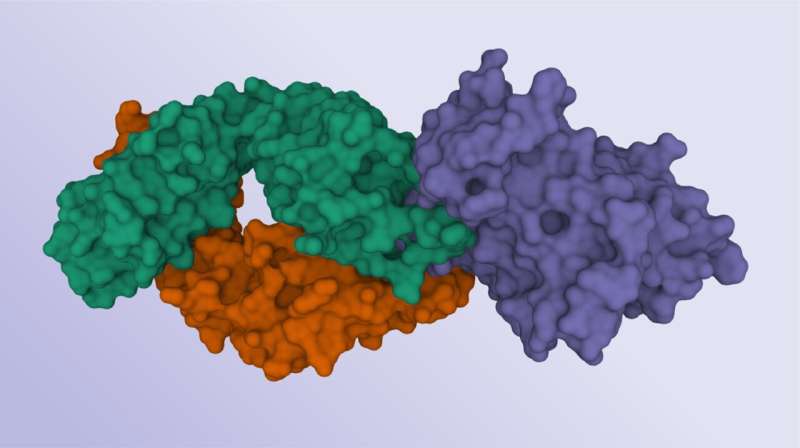Crystal structure: An antibody (red and green) binds to the HCV surface protein "E2" (purple). Credit: Timm Weber/UK Köln
The hepatitis C virus (HCV) is a genetically highly variable virus that mutates extensively. An effective vaccine would therefore need to evoke broadly neutralizing antibodies that not only neutralize one HCV strain, but as many of the worldwide circulating genotypes as possible. To date, all attempts to develop a vaccine have failed. A better understanding of the antibody response to HCV is needed in order to provide new impetus to the development of a vaccine. The initial question for the study was therefore: What particular properties of the antibodies against HCV lead to broad neutralization of the virus?
The study
First authors Timm Weber and Julian Potthoff, of the Cologne University Hospital, explained that, "For this work, we took our expertise from our HIV research into account. We studied a large patient cohort in our lab in order to identify so-called 'elite neutralisers'. These are individuals whose antibodies can neutralize different HCV genotypes." In order to carry out this work, the scientists cooperated within the German Center for Infection Research with the team of Prof. Thomas Pietschmann and Prof. Thomas Krey, two experts in the area of HCV research. "We have already been working a long time in Hannover on methods to measure antibody‑mediated neutralization of globally circulating HCV strains in the lab as close to physiological conditions as possible," says Pietschmann.
In a cohort of 435 hepatitis C patients, up to five percent showed extraordinary HCV neutralizing activity. The team isolated more than 300 antibodies from the blood of four of these elite neutralisers, among which were some that were able to render the hepatitis C virus harmless with particular efficiency. With the help of structural and mutation analyses, the researchers characterized these special antibodies and were able to, for example, recognize which amino acid sequences influenced the neutralizing ability. A laboratory at the renowned California Institute of Technology in Pasadena contributed the structural biological analyses and visualized where exactly the antibodies bind to the virus.
A synthetic antibody resulting from machine learning
The scientists went a step further after they characterized the antibodies. Computer scientists working with Prof. Nico Pfeiffer in Tübingen developed a computer program that was supplied with amino acid sequences of highly and poorly neutralizing HCV antibodies and was then able to predict whether an antibody could neutralize the virus effectively. This method of machine learning allowed the researchers to artificially assemble a synthetic, broadly HCV neutralizing antibody.
"This artificially assembled antibody against hepatitis C can represent an important basis for vaccine development," reported the study leader Prof. Florian Klein, a scientist at the German Center for Infection Research at the Cologne University Hospital.
As a next step, the scientists now plan to test the most potent antibodies in animal models. Coordinated by Thomas Pietschmann and Thomas Krey, the German Center for Infection Research is additionally already researching new vaccination strategies against HCV; the new discoveries are already being incorporated for this.
The research was published in Immunity.
More information: Timm Weber et al, Analysis of antibodies from HCV elite neutralizers identifies genetic determinants of broad neutralization, Immunity (2022). DOI: 10.1016/j.immuni.2021.12.003
Journal information: Immunity
Provided by German Center for Infection Research
























